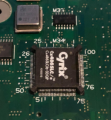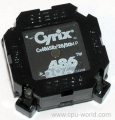Marty:CPU Upgrade: Difference between revisions
Cyo.the.vile (talk | contribs) (Created page with "== 486 CPU Upgrade == Marty uses a 386 CPU clocked at 16mhz (from a nearby 32mhz clock. Divider is set by 2) running on a 16bit BUS on the motherboard. What this means is that with a 486 CPU upgrade there are few changes or enhancements to gameplay. It also runs a tremendous risk of damaging the motherboard when removing a CPU with 100 pins. However, if you wish to proceed there is a known good example from Deunan. Two methods can be used to remove the CPU. Chip...") |
Cyo.the.vile (talk | contribs) No edit summary |
||
| Line 2: | Line 2: | ||
Marty uses a 386 CPU clocked at 16mhz (from a nearby 32mhz clock. Divider is set by 2) running on a 16bit BUS on the motherboard. What this means is that with a 486 CPU upgrade there are | Marty uses a 386 CPU clocked at 16mhz (from a nearby 32mhz clock. Divider is set by 2) running on a 16bit BUS on the motherboard. What this means is that with a 486 CPU upgrade there are almost changes or enhancements to gameplay. For a very small handful of intensive schmups such as Tatsujin Oh it might improve gameplay but marginal at best. | ||
It also runs a tremendous risk of damaging the motherboard when removing a CPU with 100 pins. | ''' It also runs a tremendous risk of damaging the motherboard when removing a CPU with 100 pins. Advanced users only. ''' | ||
Two methods can be used to remove the CPU. Chipquick is recommended for anyone skittish about using hot air. The second method can be hot air provided you have experience in removing large ICs such as Saturn/Dreamcast BIOS chips for example. If you upgrade the CPU it is recommended after the operation is confirmed to add a heatsink. The 486 CPU runs hot in Marty. A low-profile heatsink such as one meant for a Raspberry Pi is recommended. | However, if you wish to proceed there is a known good example from Deunan. | ||
Two methods can be used to remove the CPU. Chipquick method is recommended for anyone skittish about using hot air. EEVBlog on Youtube did a very good guide with Chipquick which you can find [https://www.youtube.com/watch?v=UmD7F0--7Lc&t=2s here] | |||
The second method can be hot air provided you have experience in removing large ICs such as Saturn/Dreamcast BIOS chips for example. If you upgrade the CPU it is recommended after the operation is confirmed to add a heatsink. The 486 CPU runs hot in Marty. A low-profile heatsink such as one meant for a Raspberry Pi is recommended due to the metal shielding inside Marty making space limited above the CPU. | |||
<gallery> | <gallery> | ||
| Line 13: | Line 17: | ||
File:Screenshot 17.png|CX486SLC Upgrade | File:Screenshot 17.png|CX486SLC Upgrade | ||
</gallery> | </gallery> | ||
The other way to upgrade the CPU on Marty is using a clip-on CPU upgrade meant for old 386SX motherboards. These clips generally run '''very high''' and are known in the retro computer scene as being unreliable. | |||
<gallery> | |||
File:Screenshot 18.png|486SRX2 Clip-on Module clips on CPU, disables the 386 and runs the 486 onboard. | |||
</gallery> | |||
==Other applications of 486 Upgrade== | |||
With a 486 inside Marty you can enable the 1kb of cache inside the CPU provided you make a program or force it with ODE. However when you enable this many games break such as gamepad input not working, mouse input not working anymore and sound breaking to name a few. | |||
==References== | |||
https://gdemu.wordpress.com/2018/05/31/motherboard/ | |||
https://nfggames.com/forum2/index.php?topic=7148.0 | |||
Latest revision as of 21:04, 31 July 2022
486 CPU Upgrade
Marty uses a 386 CPU clocked at 16mhz (from a nearby 32mhz clock. Divider is set by 2) running on a 16bit BUS on the motherboard. What this means is that with a 486 CPU upgrade there are almost changes or enhancements to gameplay. For a very small handful of intensive schmups such as Tatsujin Oh it might improve gameplay but marginal at best.
It also runs a tremendous risk of damaging the motherboard when removing a CPU with 100 pins. Advanced users only.
However, if you wish to proceed there is a known good example from Deunan.
Two methods can be used to remove the CPU. Chipquick method is recommended for anyone skittish about using hot air. EEVBlog on Youtube did a very good guide with Chipquick which you can find here
The second method can be hot air provided you have experience in removing large ICs such as Saturn/Dreamcast BIOS chips for example. If you upgrade the CPU it is recommended after the operation is confirmed to add a heatsink. The 486 CPU runs hot in Marty. A low-profile heatsink such as one meant for a Raspberry Pi is recommended due to the metal shielding inside Marty making space limited above the CPU.
The other way to upgrade the CPU on Marty is using a clip-on CPU upgrade meant for old 386SX motherboards. These clips generally run very high and are known in the retro computer scene as being unreliable.
Other applications of 486 Upgrade
With a 486 inside Marty you can enable the 1kb of cache inside the CPU provided you make a program or force it with ODE. However when you enable this many games break such as gamepad input not working, mouse input not working anymore and sound breaking to name a few.



